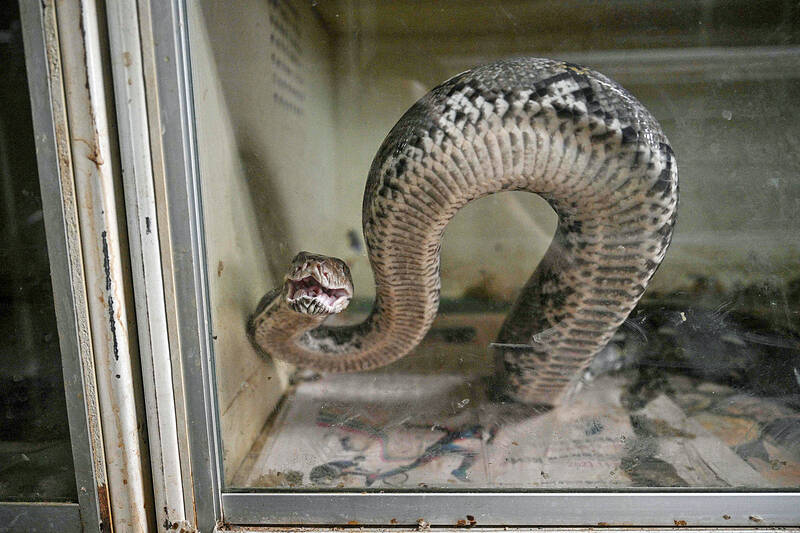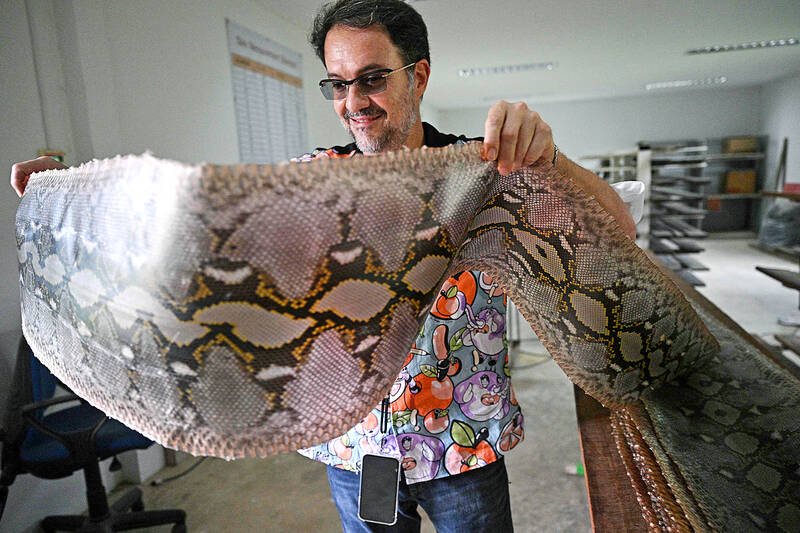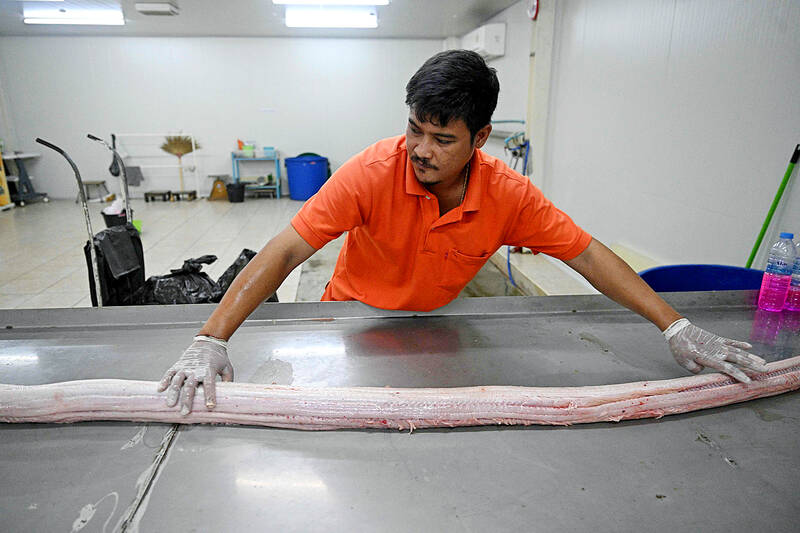In a warehouse in the lush humid farmlands of central Thailand, thousands of pythons lie coiled in containers, rearing and striking at the glass as people pass by.
They are being raised for their robust, diamond-patterned skins, which are sold to high-end European fashion houses for belts, bags and handbags, but some scientists and industry insiders believe the snakes’ true value could lie in their meat.
Demand for meat is growing globally, despite the carbon footprint associated with traditional livestock, and while a plant-based diet is often touted as the best alternative, some feel reptiles have been overlooked as an option.

Photo: AFP
Snakes can tolerate high temperatures and drought, reproduce quickly and grow far faster than traditional sources of animal protein, while consuming a lot less food.
Researchers estimate that China and Vietnam alone have at least 4,000 python farms, producing several million snakes, mostly for the fashion industry.
“Python farming may offer a flexible and efficient response to global food insecurity,” concluded a study published earlier this year in the journal Nature.

Photo: AFP
The researchers spent a year studying nearly 5,000 reticulated and Burmese pythons at two commercial farms in Vietnam and Thailand.
“They can survive for months on end with no food at all and no water, and literally they won’t lose condition at all,” said Patrick Aust, director of the African Institute of Applied Herpetology and one of the scientists involved in the study.
The pythons were fed waste chicken and wild-caught rodents and offered a more efficient feed-to-meat ratio than poultry, beef and even crickets.

Photo: AFP
They also reproduce rapidly, Aust said, with female pythons laying between 50 and 100 eggs annually.
COMPLETE WASTE
That is music to the ears of Emilio Malucchi, whose farm in central Thailand’s Uttaradit houses around 9,000 pythons.
Malucchi, who moved to Thailand from Italy with his family more than four decades ago, has had little success convincing people to take up snake meat, and most of what he produces is either discarded or goes to fish farms.
“It’s a complete waste,” he said. “I eat my snakes because I know what they eat and how I raise them,” he said.
Wild python has long been eaten throughout Southeast Asia, but the meat has yet to attract widespread international interest despite offering a chicken-like texture low in saturated fats.
“The problem is that there is no market for python flesh. We need to educate people about its possibilities,” said Malucchi.
The climate impact of meat has been extensively documented, with the UN’s Intergovernmental Panel on Climate Change noting that meat from grazing animals — mainly beef — has been “consistently identified as the single food with the greatest impact on the environment.”
That effect is both in terms of greenhouse emissions and land use change.
While the UN and climate activists advocate moving to a more plant-based diet, the OECD estimates demand for meat will increase 14 percent by 2032, driven by population growth in low-income regions and rising living standards in Asian countries.
Meanwhile, drought and extreme weather are making traditional farming increasingly difficult in many parts of the world where the need for protein is urgent. Protein-energy malnutrition, sometimes called protein-energy undernutrition, caused nearly 190,000 deaths globally in 2021, according to the Global Burden of Disease study.
‘NICE AND CRISPY’
That paradox has spurred a push to explore meat alternatives, from edible insects to lab-grown meats.
But uptake of these alternatives has not yet been significant and commercial python farmers face strict processing standards that the industry complains are outdated.
Despite these challenges, Aust believes python farming has “huge potential” and is enthusiastic about its merits.
“You can barbecue it or eat it in curries and stews. I like to fry it in garlic butter until it’s nice and crispy,” he said.
“It’s a very versatile meat.”
Animal welfare organizations are less impressed.
Earlier this year, animal rights group PETA accused Malucchi’s farm of cruelty after secretly documenting his pythons being killed with hammers before being skinned.
Malucchi has placed large posters on his walls on how to kill pythons “humanely” and said his industry is no different from other types of livestock farming.
“Farm animals are slaughtered all over the world,” he said.
“Pythons are no different.”

May 26 to June 1 When the Qing Dynasty first took control over many parts of Taiwan in 1684, it roughly continued the Kingdom of Tungning’s administrative borders (see below), setting up one prefecture and three counties. The actual area of control covered today’s Chiayi, Tainan and Kaohsiung. The administrative center was in Taiwan Prefecture, in today’s Tainan. But as Han settlement expanded and due to rebellions and other international incidents, the administrative units became more complex. By the time Taiwan became a province of the Qing in 1887, there were three prefectures, eleven counties, three subprefectures and one directly-administered prefecture, with

It’s an enormous dome of colorful glass, something between the Sistine Chapel and a Marc Chagall fresco. And yet, it’s just a subway station. Formosa Boulevard is the heart of Kaohsiung’s mass transit system. In metro terms, it’s modest: the only transfer station in a network with just two lines. But it’s a landmark nonetheless: a civic space that serves as much more than a point of transit. On a hot Sunday, the corridors and vast halls are filled with a market selling everything from second-hand clothes to toys and house decorations. It’s just one of the many events the station hosts,

Among Thailand’s Chinese Nationalist Party (KMT) villages, a certain rivalry exists between Arunothai, the largest of these villages, and Mae Salong, which is currently the most prosperous. Historically, the rivalry stems from a split in KMT military factions in the early 1960s, which divided command and opium territories after Chiang Kai-shek (蔣介石) cut off open support in 1961 due to international pressure (see part two, “The KMT opium lords of the Golden Triangle,” on May 20). But today this rivalry manifests as a different kind of split, with Arunothai leading a pro-China faction and Mae Salong staunchly aligned to Taiwan.

Two moves show Taichung Mayor Lu Shiow-yen (盧秀燕) is gunning for Chinese Nationalist Party (KMT) party chair and the 2028 presidential election. Technically, these are not yet “officially” official, but by the rules of Taiwan politics, she is now on the dance floor. Earlier this month Lu confirmed in an interview in Japan’s Nikkei that she was considering running for KMT chair. This is not new news, but according to reports from her camp she previously was still considering the case for and against running. By choosing a respected, international news outlet, she declared it to the world. While the outside world